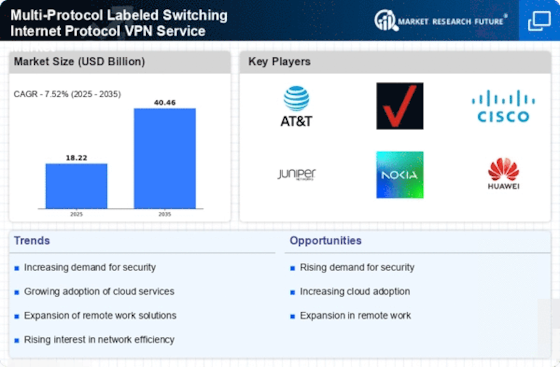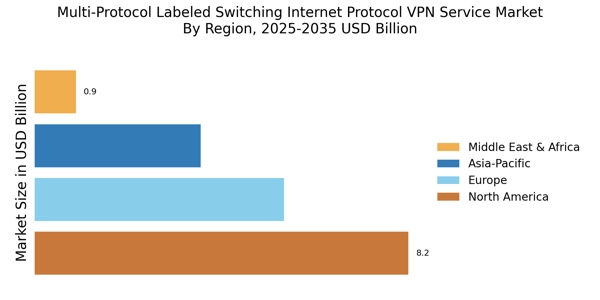Rising Cybersecurity Concerns
Cybersecurity threats are a pressing concern for organizations, driving the demand for robust security solutions within the Multi-Protocol Labeled Switching Internet Protocol VPN Service Market. MPLS VPNs provide enhanced security features, such as encryption and traffic segmentation, which are essential for protecting sensitive data. As cyberattacks become more sophisticated, businesses are compelled to invest in secure networking solutions. The market is projected to grow as organizations recognize the importance of safeguarding their data and maintaining compliance with regulatory requirements, further solidifying the role of MPLS VPNs in their security strategies.
Growing Need for Network Scalability
The Multi-Protocol Labeled Switching Internet Protocol VPN Service Market is experiencing a surge in demand for scalable network solutions. As businesses expand, their networking needs evolve, necessitating flexible and scalable VPN services. MPLS VPNs offer the ability to efficiently manage increased data traffic and support diverse applications. According to recent data, the market for MPLS VPN services is projected to grow at a compound annual growth rate of approximately 10% over the next five years. This growth is driven by the need for organizations to adapt to changing market conditions and technological advancements, ensuring that their network infrastructure can accommodate future demands.
Integration of Advanced Technologies
The integration of advanced technologies, such as artificial intelligence and machine learning, is transforming the Multi-Protocol Labeled Switching Internet Protocol VPN Service Market. These technologies enhance the performance and efficiency of MPLS VPN services by enabling predictive analytics and automated network management. As organizations seek to optimize their network operations, the adoption of AI-driven solutions is likely to increase. This trend suggests a shift towards more intelligent networking solutions that can adapt to changing conditions and improve overall service delivery, thereby driving growth in the MPLS VPN market.
Increased Adoption of Remote Work Solutions
The shift towards remote work has significantly influenced the Multi-Protocol Labeled Switching Internet Protocol VPN Service Market. Organizations are increasingly adopting MPLS VPN services to provide secure and reliable access to corporate networks for remote employees. This trend is underscored by the fact that a substantial percentage of companies are investing in VPN solutions to enhance their remote work capabilities. The MPLS VPN market is expected to witness a notable increase in demand as businesses prioritize secure connectivity for their distributed workforce, thereby ensuring data integrity and confidentiality.
Demand for Cost-Effective Networking Solutions
Cost efficiency remains a critical factor influencing the Multi-Protocol Labeled Switching Internet Protocol VPN Service Market. Organizations are increasingly seeking cost-effective networking solutions that do not compromise on performance or security. MPLS VPNs offer a balance between cost and functionality, making them an attractive option for businesses looking to optimize their IT budgets. Recent market analysis indicates that companies are prioritizing investments in MPLS VPN services as a means to reduce operational costs while maintaining high-quality network performance, thereby contributing to the overall growth of the market.


















